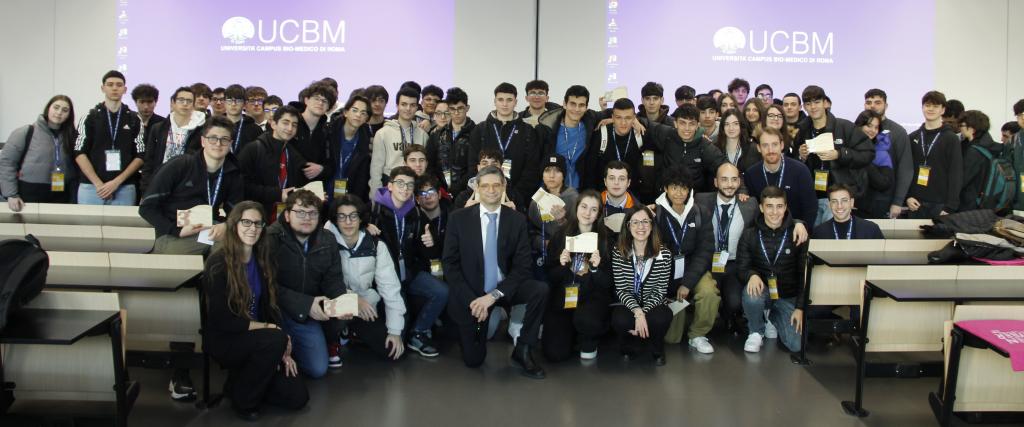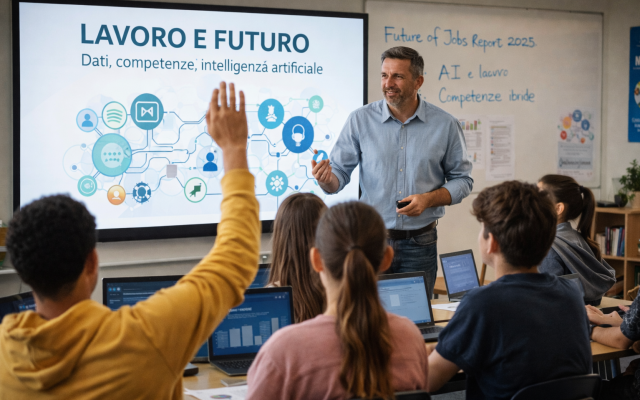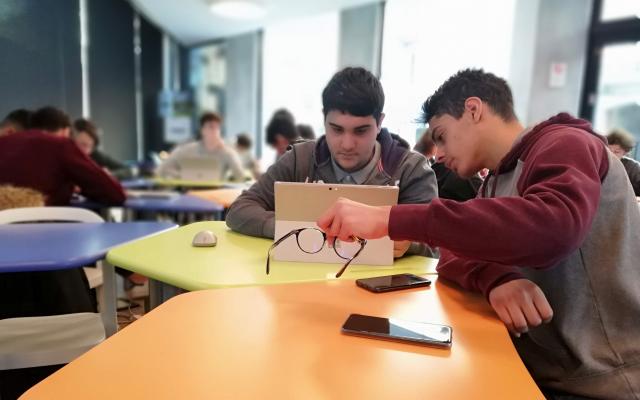Ambizione Italia: round table and 80-student challenge on security.
Yesterday was an intense day at the Campus Bio-Medico University of Rome: 80 upper secondary school students met as part of Programme Ambizione Italia for Cybersecurity, promoted by the Fondazione Mondo Digitale and Microsoft Italia [see news: The Human Factor in Security].
The event also included the final Hacker vs. Hacker Challenge, a session dedicated to learning how to defend oneself from simple, but effective, cyberattacks. The 80 civic hackers were selected from 700 students from 33 schools in 9 Italian regions who participated in the cybersecurity course [see news: Hacking: Is It Just about Coding?]. University professors and cybersecurity experts from the corporate world participating in the event emphasized that it is necessary to begin with the "human factor" in order to manage the sudden technological evolution. It was a marathon on IT security but also a precious opportunity to discuss and reflect on the speed of progress and how to govern it in order to guarantee the well-being of individuals. The introductory round table addressed the progress made in terms of digitalisation culture and IT security in Italy, which is rising from the bottom of the European rankings thanks to the increase in the digitalisation of public services, training programmes in schools and in universities, and a reduction of the gender gap.
Eugenio Guglielmelli, Rector of the Campus Bio-Medico University of Rome, in his welcome greetings, pointed out: “Italy places last in the rankings on cybersecurity culture and yet 10% of Italians are directly affected by cyberattacks on personal devices. Biosecurity is one of the frontiers of our academic courses: the concrete contribution of the human component to the prevention and protection of attacks.”
Andrea Rossi, CEO and Director General of the Campus Bio-Medico University of Rome, underlined the close link between cybersecurity and individual dignity. “This is why the topic interests us so much. It falls within our mission of attention and care for human beings. Furthermore, the university is constantly in touch with the local communities, embracing society.”
Mirta Michilli, Director General of the Fondazione Mondo Digitale, spoke about the role of the FMD in helping people seize the opportunities presented by technology and innovation, introducing youth to new study programmes and professions linked to technological evolution. “With Microsoft we are making complex themes and concepts accessible to citizens, especially to vulnerable individuals and students. Courses that bring universities, schools, and businesses together to allow students to make informed choices.”
In his address, Corrado Giustozzi, Professor of the Cybersecurity Course at the Campus Bio-Medico University of Rome and Chief Strategist of Rexilience, highlighted that, despite the incredible progress achieved, we must not consider generative artificial intelligence a perfect technology. “Think about hallucinations, i.e. the invented responses that generative artificial intelligence tools provide when they ignore the topic. Moreover, these programmes persist in denying the evidence and repeat errors. They are influenced by demand, and this makes them dangerous and limited. They must be considered only a support tool for human activity, not a substitute.”
The roundtable moderated by Luca Faramondi, Coordinator of the Master's Degree Programme in Cybersecurity Management at the Campus Bio-Medico University of Rome, featured experts such as Domitilla Benigni, CEO of Elettronica Spa and President of Women4Cyber. Mario Garofano, Chief Information Security Officer at the Campus Bio-Medico University of Rome highlighted: “the digital divide must also be bridged through a greater digitalisation of the public administration, an issue that should also be extended to transversal digital skills in companies,” while Alessandro Massa, Chief Technology and Innovation Officer, Cyber and Security Solutions at Leonardo, spoke of the human factor as “one of the threats to security if those who use the technology do not know the tools well. Hence, the need to bridge the knowledge gap at all levels, from infrastructure to skills. Evaluate your academic career, a PhD makes all the difference in completing the mindset for continuous research and innovation,” he concluded. Patrizio Rinaldi, Head of Technical Sales, Cybersecurity & Data Protection, Microsoft added: “there are three million jobs to be claimed in Italy. Cybersecurity is a multi-faceted field full of interrelated topics. It's time to choose it as a career. Don't be afraid to undertake these studies. Inform yourselves! Young people in Italy also suffer from a lower digitalisation rate than in the rest of Europe, but thanks to the digitalisation of services, the cloud, and other processes this gap is decreasing".
According to Anna Vaccarelli, Technology Director at the CNR Institute for Informatics and Telematics and Board Member of Women for Security: “the percentage of women in cybersecurity is growing. Industries, institutions, and universities are working hard to bridge the gap but there still are few female graduates compared to men. Let's not forget that the world of cybersecurity ranges from economics to jurisprudence. I am thinking of communications, management, and legal, philosophical, and mathematical aspects. Marco Valerio Cervellini, Advisor of the National Cybersecurity Agency, recalled the work of his institution that has foiled major attacks on the protection of citizens and often found itself dealing with very young talents dedicated to crime. Cervellini invited young enthusiasts to train and contact his Agency to evaluate professional opportunities. Roberto Setola, Delegate of the Rector for Research and Innovation on Cybersecurity at the Campus Bio-Medico University of Rome, encouraged those interested in more technical degrees: "choose the faculty of engineering because you will create things that don't exist! You will have fun! Cybersecurity is the pinnacle of lateral thinking that teaches us how to think outside the box. It is synonymous with curiosity and must always be fuelled.”
Students participated enthusiastically in the morning debate, posing challenging questions and issues on artificial intelligence and cybersecurity to the experts in the room. The topics ranged from study choices to recommended certifications, right up to current cybercrime cases.
Students from the following schools participated: Michelangelo Buonarroti - Frascati, Leopoldo Pirelli - Rome, Einstein-Bachelet - Rome, I. Newton - Rome, Croce Aleramo - Rome, Enrico Fermi - Frascati, Omnicomprensivo - Venafro, Pacinotti - Fondi, Patini Liberatore - Castel di Sangro, Caravaggio - Rome, Istituto Maria Immacolata - Carugate, Tommaso Salvini - Rome, Bagatta di Desenzano - Garda, Ferraris - Varese, Pacinotti Archimede - Rome, Matteucci - Rome, Di Vittorio-Lattanzio - Rome.
The final challenge was organised by Coaches Luca Faramondi and Simone Guarino, PhD Candidate in Cybersecurity, CoserityLab.
Onelia Onorati reported on the event.





